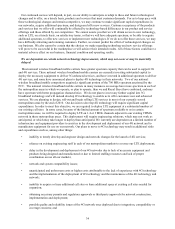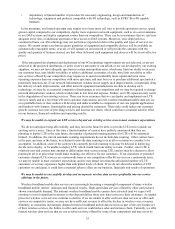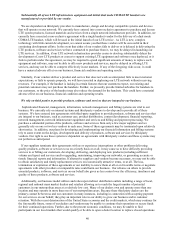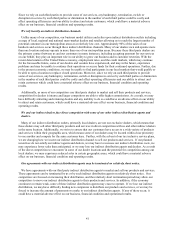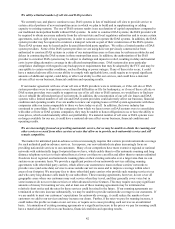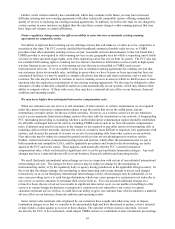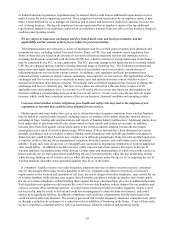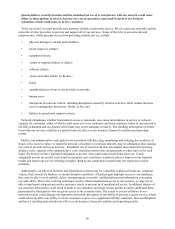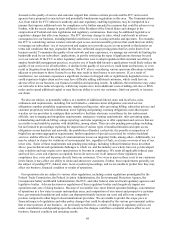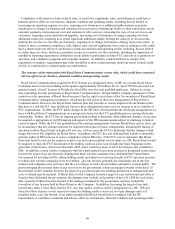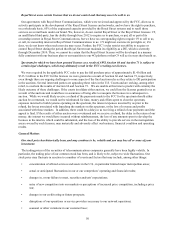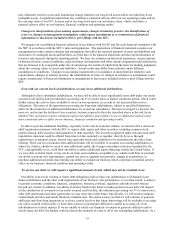Metro PCS 2009 Annual Report Download - page 55
Download and view the complete annual report
Please find page 55 of the 2009 Metro PCS annual report below. You can navigate through the pages in the report by either clicking on the pages listed below, or by using the keyword search tool below to find specific information within the annual report.43
Further, as the wireless industry has consolidated, which may continue in the future, we may have increased
difficulty entering into new roaming agreements with other technically compatible carriers offering comparable
quality of service or replacing our existing roaming agreements. In addition, we believe the rates we are charged by
certain carriers in some instances are higher than the rates these carriers charge to other roaming partners that may
have large call volumes or certain affiliations.
Future regulatory changes may also affect our ability to enter into new or maintain existing roaming
agreements on competitive terms.
Our ability to replicate these roaming service offerings at rates that will make us, or allow us to be, competitive is
uncertain at this time. The FCC recently clarified that broadband commercial mobile radio service, or CMRS
providers must offer automatic roaming services on just, reasonable and non-discriminatory terms, but found that a
CMRS provider is not required to offer roaming services in any geographic area for which a requesting carrier holds
a license or other spectrum usage rights, even if the requesting carrier has not yet built its system. The FCC also has
not extended full roaming rights to roaming services that are classified as information services (such as high-speed
wireless Internet access services), or for roaming services that are not classified as CMRS (such as non-
interconnected services). If we are unable to enter into or maintain roaming agreements for roaming services that
our customers desire at reasonable rates, including in areas where we have licenses or lease spectrum but have not
constructed facilities, we may be unable to compete effectively and attract and retain customers, and we may lose
revenues. We also may be unable to continue to receive roaming services in areas in which we hold licenses or lease
spectrum after the expiration or termination of our existing roaming agreements. We also may be obligated to allow
customers of other technically compatible carriers to roam automatically on our systems, which may enhance their
ability to compete with us. If these risks occur, they may have a material adverse effect on our business, financial
condition and operating results.
We may incur higher than anticipated intercarrier compensation costs.
When our customers use our service to call customers of other carriers, in certain circumstances we are required
under the current intercarrier compensation scheme to pay the carrier that serves the called party, and any
intermediary or transit carrier, for the use of their networks. However, as a wireless carrier we are not entitled to
receive access payments from interexchange carriers who route calls for termination on our network. A longstanding
FCC rulemaking proceeding is examining whether a unified intercarrier compensation regime should be established
for all traffic exchanged between all carriers, including CMRS carriers such as us. New intercarrier compensation
rules, if adopted, may result in increases in the charges we are required to pay other carriers for terminating calls or
transiting calls over their networks, increase the costs of, or make it more difficult to negotiate, new agreements with
carriers, and decrease the amount of revenue we receive for terminating calls from other carriers on our network.
New rules also may be subject to a transition period or policies that are not advantageous to wireless carriers.
Further, certain intercarrier compensation pricing rules and policies, which affect the termination rates we pay to
both incumbent and competitive LECs, and the applicable procedures and forum for decision-making, are under
appeal at the FCC and in the courts. These appeals could materially alter the FCC’s current intercarrier
compensation rules, which could result in significant costs to us for past and future termination charges. Any such
changes may have a material adverse effect on our business, financial condition and operating results.
We resell third party international interexchange services in connection with certain of our unlimited international
interexchange services. The charges for these services may be subject to change by the terminating or
interconnecting carrier, or by the regulatory body or agency having jurisdiction in the applicable foreign country. In
the event that the charges change, the terminating or interconnecting carrier may attempt to assess such charges
retroactively on us or our third party international interexchange carrier, which charges may be substantial, or we
may cease providing service to such foreign destination, which may cause prospective customers to not subscribe to
our service or current customers to terminate their service from us. If we are assessed additional charges on a
retroactive basis, the use of our services results in significant intercarrier costs, we are unable or unwilling to offer
services to certain foreign destinations, or prospective customers do not subscribe to our service or current
customers terminate service with us, it could limit our ability to grow our customer base which could have a material
adverse effect on our business, financial condition and operating results.
Some carriers who terminate calls originated by our customers have sought, and others may seek, to impose
termination charges on us that we consider to be unreasonably high and have threatened to pursue, or have initiated
or may initiate, claims against us to recover these charges. The outcome of these claims is uncertain. A recent
decision by the FCC, if not overturned, could subject CMRS carriers to a multitude of state commission proceedings



